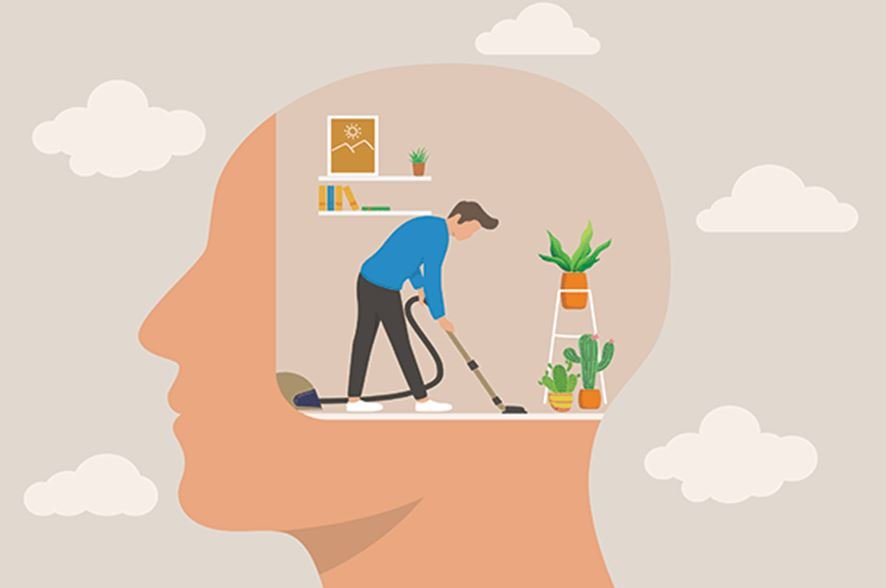Health
What is the Connection of Mental Health with Cleaning?

Physical health and mental health go hand in hand. If any one of them deteriorates, so does the other. Good mental health corresponds to good physical health, and good physical health corresponds to good mental health.
Just like the circle of life, this goes around too. Cleanliness plays a major role in a person’s well-being and health. We have heard our mothers telling us to wash our hands before eating. A small act of cleaning before you have a meal goes a long way.
Advertisements for soaps on television also promote this culture. Ever wondered why? People who keep themselves, their belongings, and their environment clean are more likely to be healthy and stay safe from any illnesses, compared to those who do not care about cleanliness.
Since the circle of physical health corresponding to mental health and vice versa goes on, directly or indirectly, our cleanliness is connected to our mental health.
Let us have a look at a few of the benefits of cleaning that are associated with our mental health.
[lwptoc]
1. Effects of Cleaning on Mental Health
Cleaning has proven to be beneficial for a person’s well-being mentally. Here are some of the many positive effects of cleaning.
2. Helps You Gain Control of the Environment
Most of us can relate to this happening with us. If not multiple times, then at least once in our life, we have been through a stage where we feel that our life is falling apart. We can do nothing about it; we feel powerless and have no control over the situation.
However, cleaning our surroundings can give us a sense of control in our lives. We feel that we have power, that we are capable of changing things around us. This makes us feel mentally strong and provides a ray of positivity amongst the negative thoughts in our minds.
A study conducted at the University of Connecticut proves by experimentation that cleaning gives people a sense of control during chaotic times. Cleaning is essential in boosting our mental health and our well-being.
3. Helps in Improving Our Mood
Studies have shown that living in a clean house helps reduce anxiety. Those with cleaner environments were happier than the ones who had an untidy sitting space.
A clean house makes you feel more organized. Sleeping on a clean bed and properly set bed sheets allows you to have a better night’s sleep. Getting an ample amount of rest has numerous mental health benefits, such as improving our mood and making us happier than before.
4. CleaningReleases Endorphins
Cleaning is a form of exercise which a lot of people practice every day. It isn’t done just as a source of distraction. It is a lifestyle. Some people clean as part of their responsibility. Whatever the reason is cleaning is a great exercise for our body and mind.
Since we are putting in the effort while cleaning, it helps us stay fit and active. Moreover, it releases endorphins in our bodies.
Endorphins are chemicals released by our body that help relieve stress and induce feelings of happiness. Cleaning involves enough exercises that release endorphins. Endorphins help us elevate our moods and lessen the amounts of stress and anxiety.
5. Makes You Feel More Organized
When you don’t keep your things in their places, and there is clutter all around you, it induces feelings of confusion, tension, irritability, and worry. Cleaning things and keeping them in their appropriate places will make you feel more classified and organized. Clean places are generally associated with positive feelings and make you feel happy, refreshed, and calm.
6. Helps You Find Inspiration
Imagine finding your old lost valuables while you clean your space? That feeling cannot be defined in words. Often those objects are associated with our sentiments. Once you allow yourself to reflect on those objects, re-evaluate their importance, you are likely to pick up on a project or resume your paused projects, getting inspired from the thoughts associated with that object. Completing pending things eases your mind and makes you feel healthier mentally.
Related: The Tremendous Health Benefits Of Jumping On The Biggest Trampolines In The World
Effects on Mental Health When Cleaning Is Not Observed
While cleaning can have many positive effects on our mental health, messy environments and clutter can affect our mental health negatively. Some of the negative impacts of the mess around us and lack of cleaning are:
1. Constant State of Irritability
If you live in a messy room all day, every day, if the desk is covered in dust and useful things are also thrown over the floor, you will never be able to find what you need at that hour. Unable to get the desired book or your favorite pen, which you failed to keep in its place, will make you feel annoyed and irritated. Moreover, you will start losing your motivation to work.
2. Depression
Constant sadness due to unclean environments may lead to depression if ignored for long periods.
Effects of Mental Health on Cleaning
Mental health plays a great part in determining the state of our cleanliness. Any mentally stable person would take care of his things, keep them clean, and keep himself and his environment clean. But same cannot be said about a mentally unstable person.
A mentally unstable person does not take care of cleanliness; he/she does not care if his environment or he is clean or dirty. Sometimes they become excessively conscious about cleanliness, and sometimes they are least bothered by it.
Mental illnesses and disorders that cause such problems are described below:
1. OCD (Obsessive Compulsive Disorder)
OCD is a mental disorder in which a person has recurrent and persistent thoughts that are known as obsessions. The person is not able to stop thinking about that and feels the drive to act upon it. In most cases, these thoughts are about cleanliness.
The person keeps thinking that everything around him is dirty and bacteria are roaming all over and that it must be cleaned. This thought drives the person to get up and clean the place. As soon as they clean the place, the same thought comes to their mind again, and the person gets up to clean all over again.
It can go on for hours; the person may get exhausted but still would not stop cleaning. This is also known as the cleaning disorder, as the person has thoughts related to dirt and cleanliness only.
2. Depression, Stress, Anxiety, and PTSD (Post Traumatic Stress Disorder)
Depression, stress, anxiety, and PTSD also have a great impact on our personal hygiene and cleanliness. People suffering from these disorders are seen to be careless about their personal hygiene. They struggle to do basic hygiene tasks like brushing their teeth, taking a bath, cutting and cleaning their nails, and wearing clean, presentable clothes.
Depression is characterized by fatigue and lack of interest in performing daily life chores, and so the person does not have enough strength to even wash their face or comb their hair. They don’t even care if their room is clean or messy. We can say that a person’s mental health greatly affects a person’s cleaning habits.
3. Schizophrenia
It is a chronic mental disorder that affects a person’s cognition, perception, memory, expression of emotions, and every other bodily function. One of the symptoms of this disease is apathy. Apathy is the lack of motivation to do any work.
People suffering from schizophrenia tend to be careless about their cleaning habits. Such people usually have worse physical appearances, their hair and teeth remain un-brushed, their rooms are a mess. They do not care about the situation around them or the condition that they are in.
Researches Carried Out On the Relation between Cleanliness and Mental Health
Many research studies have been done on the relationship between cleanliness and mental health and the positive and negative effects of each of them on the other.
The most dominant findings from a few institutes have been listed below:
- The Anxiety And Depression Association Of America(ADAA)states that physical activity (such as cleaning) reduces stress, anxiety, and depression. It also reduces fatigue and improves concentration.
- According to a study published in the journal mindfulness, it was found that participants who engaged themselves in mindfully washing the dishes, i.e., taking a moment to inhale the scent of soap and allowing their skin to absorb the warmth of the water, reported 27% reduction in nervousness and a 25% improvement in mental inspiration.”
Conclusion
To conclude, the connection between cleanliness and mental health;is safe to say that a cleaner environment contributes to a cleaner body and cleaner mind. Cleaning helps to reduce stress, manage depression, and many more psychological disorders.
Cleaning is also used as a coping mechanism mostly by teenagers exhausted after hours of studying and Carpet Cleaning Oxford workers after a tiring day at work. Usually, when parents are stressed or undergoing feelings that induce anxiety, they distract themselves by cleaning their house, bathing their babies, washing dishes, etc.
If our surroundings are not kept clean, they give rise to feelings of irritation and also make you sad. People who are least bothered by the state of their surroundings or are excessively careful about cleaning are most likely to be facing mental disorders. They must consult a professional to rule out the possibility or for medical advice.
Related Post: Tips to Build Student’s Confidence and Self-Esteem Through Practice
-

 Entertainment2 months ago
Entertainment2 months agoBflix.gg Not Working? Here’s Where You Can Stream Free Now
-

 Fashion2 months ago
Fashion2 months agoVintage Styles Making a Comeback: Trends You Should Know
-

 Tech1 month ago
Tech1 month agoLatest Durostech Updates: Key Highlights
-

 Entertainment2 months ago
Entertainment2 months agoIs Shannon Reardon the Same as Swanick? Here’s What We Know






